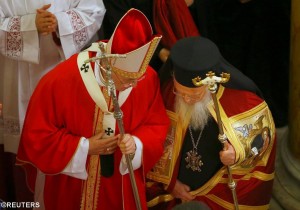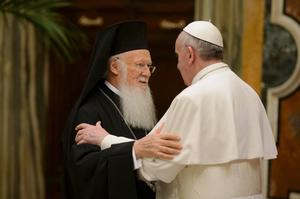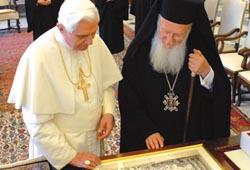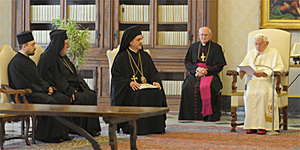Tag: Patriarch Bartholomew
Nicea III for 2025 pope and patriarch announce
Pope Francis and Patriarch Bartholomew made the VERY bold proposal that in 2025 the Churches ought to meet in an ecumenical synod (meeting). This is not Vatican III, depending on the scope of the Church’s heads, it is likely to be bigger than that. This event, this gathering, could be a considerable groundbreaking event for the universal CHURCH, east and west.
The 1964 meeting with Pope Paul VI and Patriarch Athenagoras in Jerusalem –which was just feted for being 50 years old– now has an identifiable fruit: a fuller understanding of announcing Jesus Christ as a fact and that His embrace is for all people.
A worldwide meeting of this type will not simply be a commemoration of the Council of Nicea (AD 325) nor merely an administrative session to figure out how to promulgate decrees. It is a step, in my opinion, toward uniting Christians from East and West, small yet deliberative gestures are a good thing. Hence, it is premature to say that this is a meeting leading to definitive eucharistic unity.
AsiaNews is reporting that His All Holiness Bartholomew, Ecumenical Patriarch of Constantinople, wants an ecumenical “gathering” to be held in Nicea (now Iznik, 130 km south- east of Istanbul) in 2025.
Speaking exclusively with AsiaNews, Bartholomew says that together with Pope Francis “we agreed to leave as a legacy to ourselves and our successors a gathering in Nicaea in 2025, to celebrate together, after 17 centuries, the first truly ecumenical synod, where the Creed was first promulgated.”
The exact nature of the meeting is unknown at present. In fact, there has been no formal announcement of, or a decree convoking of an official gathering of bishops by the Vatican. Hence, It is very early to jump to conclusions that such an Ecumenical Council involving bishops from both the Orthodox and Roman Catholic Churches would take place.The Orthodox Patriarch did say last week that “a meeting of the Catholic-Orthodox Joint Commission will be held hosted by the Greek Orthodox patriarch Theophilos III. It is a long journey in which we all must be committed without hypocrisy.”
What does the proposed 2025 meeting in Nicea mean right now? It shows a clear commitment of the heads of two churches to the process of concrete dialogue. Theological and fraternal conversation is an act of competent theologians taking the needed time to allow certain pieces of data to mature. The work of dialogue doesn’t often lead to immediate action like sharing the altar, but it does lessen tensions wiping away misunderstanding. Dialogue does not mean a compromise in dogma and doctrine as there has to be internal coherence of belief.
Looking down the road a bit, I doubt that Francis and Bartholomew will be the heads of their respective Churches. They’ll likely age-out.
Common Declaration of Pope Francis and Patriarch Bartholomew
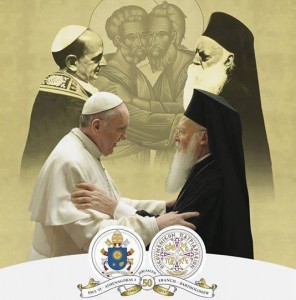 Pope Francis and the Ecumenical Patriarch, Bartholomew I, on Sunday held private talks in Jerusalem and signed a Common Declaration in which they pledged to continue on the path towards unity between the Catholic and Orthodox Churches. Their encounter marked the 50th anniversary of the historic meeting between Pope Paul VI and the Patriarch Athenagoras in 1964. In their joint declaration, Pope Francis and Patriarch Bartholomew said it is their duty to work together to protect human dignity and the family and build a just and humane society in which nobody feels excluded. They also stressed the need to safeguard God’s creation and the right of religious freedom. The two leaders expressed concern over the situation facing Christians amidst the conflicts of the Middle East and spoke of the urgency of the hour that compels them to seek the reconciliation and unity of the human family whilst fully respecting legitimate differences.
Pope Francis and the Ecumenical Patriarch, Bartholomew I, on Sunday held private talks in Jerusalem and signed a Common Declaration in which they pledged to continue on the path towards unity between the Catholic and Orthodox Churches. Their encounter marked the 50th anniversary of the historic meeting between Pope Paul VI and the Patriarch Athenagoras in 1964. In their joint declaration, Pope Francis and Patriarch Bartholomew said it is their duty to work together to protect human dignity and the family and build a just and humane society in which nobody feels excluded. They also stressed the need to safeguard God’s creation and the right of religious freedom. The two leaders expressed concern over the situation facing Christians amidst the conflicts of the Middle East and spoke of the urgency of the hour that compels them to seek the reconciliation and unity of the human family whilst fully respecting legitimate differences.
Please find below the full text in English of the Common Declaration of Pope Francis and the Ecumenical Patriarch Bartholomew I:
1. Like our venerable predecessors Pope Paul VI and Ecumenical Patriarch Athenagoras who met here in Jerusalem fifty years ago, we too, Pope Francis and Ecumenical Patriarch Bartholomew, were determined to meet in the Holy Land “where our common Redeemer, Christ our Lord, lived, taught, died, rose again, and ascended into Heaven, whence he sent the Holy Spirit on the infant Church” (Common communiqué of Pope Paul VI and Patriarch Athenagoras, published after their meeting of 6 January 1964). Our meeting, another encounter of the Bishops of the Churches of Rome and Constantinople founded respectively by the two Brothers the Apostles Peter and Andrew, is a source of profound spiritual joy for us. It presents a providential occasion to reflect on the depth and the authenticity of our existing bonds, themselves the fruit of a grace-filled journey on which the Lord has guided us since that blessed day of fifty years ago.
2. Our fraternal encounter today is a new and necessary step on the journey towards the unity to which only the Holy Spirit can lead us, that of communion in legitimate diversity. We call to mind with profound gratitude the steps that the Lord has already enabled us to undertake. The embrace exchanged between Pope Paul VI and Patriarch Athenagoras here in Jerusalem, after many centuries of silence, paved the way for a momentous gesture, the removal from the memory and from the midst of the Church of the acts of mutual excommunication in 1054. This was followed by an exchange of visits between the respective Sees of Rome and Constantinople, by regular correspondence and, later, by the decision announced by Pope John Paul II and Patriarch Dimitrios, of blessed memory both, to initiate a theological dialogue of truth between Catholics and Orthodox. Over these years, God, the source of all peace and love, has taught us to regard one another as members of the same Christian family, under one Lord and Saviour, Jesus Christ, and to love one another, so that we may confess our faith in the same Gospel of Christ, as received by the Apostles and expressed and transmitted to us by the Ecumenical Councils and the Church Fathers. While fully aware of not having reached the goal of full communion, today we confirm our commitment to continue walking together towards the unity for which Christ our Lord prayed to the Father so “that all may be one” (Jn 17:21).
3. Well aware that unity is manifested in love of God and love of neighbour, we look forward in eager anticipation to the day in which we will finally partake together in the Eucharistic banquet. As Christians, we are called to prepare to receive this gift of Eucharistic communion, according to the teaching of Saint Irenaeus of Lyon (Against Heresies, IV,18,5, PG 7,1028), through the confession of the one faith, persevering prayer, inner conversion, renewal of life and fraternal dialogue. By achieving this hoped for goal, we will manifest to the world the love of God by which we are recognized as true disciples of Jesus Christ (cf. Jn 13:35).
4. To this end, the theological dialogue undertaken by the Joint International Commission offers a fundamental contribution to the search for full communion among Catholics and Orthodox. Throughout the subsequent times of Popes John Paul II and Benedict the XVI, and Patriarch Dimitrios, the progress of our theological encounters has been substantial. Today we express heartfelt appreciation for the achievements to date, as well as for the current endeavours. This is no mere theoretical exercise, but an exercise in truth and love that demands an ever deeper knowledge of each other’s traditions in order to understand them and to learn from them. Thus we affirm once again that the theological dialogue does not seek a theological lowest common denominator on which to reach a compromise, but is rather about deepening one’s grasp of the whole truth that Christ has given to his Church, a truth that we never cease to understand better as we follow the Holy Spirit’s promptings. Hence, we affirm together that our faithfulness to the Lord demands fraternal encounter and true dialogue. Such a common pursuit does not lead us away from the truth; rather, through an exchange of gifts, through the guidance of the Holy Spirit, it will lead us into all truth (cf. Jn 16:13).
5. Yet even as we make this journey towards full communion we already have the duty to offer common witness to the love of God for all people by working together in the service of humanity, especially in defending the dignity of the human person at every stage of life and the sanctity of family based on marriage, in promoting peace and the common good, and in responding to the suffering that continues to afflict our world. We acknowledge that hunger, poverty, illiteracy, the inequitable distribution of resources must constantly be addressed. It is our duty to seek to build together a just and humane society in which no-one feels excluded or emarginated.
6. It is our profound conviction that the future of the human family depends also on how we safeguard – both prudently and compassionately, with justice and fairness – the gift of creation that our Creator has entrusted to us. Therefore, we acknowledge in repentance the wrongful mistreatment of our planet, which is tantamount to sin before the eyes of God. We reaffirm our responsibility and obligation to foster a sense of humility and moderation so that all may feel the need to respect creation and to safeguard it with care. Together, we pledge our commitment to raising awareness about the stewardship of creation; we appeal to all people of goodwill to consider ways of living less wastefully and more frugally, manifesting less greed and more generosity for the protection of God’s world and the benefit of His people.
7. There is likewise an urgent need for effective and committed cooperation of Christians in order to safeguard everywhere the right to express publicly one’s faith and to be treated fairly when promoting that which Christianity continues to offer to contemporary society and culture. In this regard, we invite all Christians to promote an authentic dialogue with Judaism, Islam and other religious traditions. Indifference and mutual ignorance can only lead to mistrust and unfortunately even conflict.
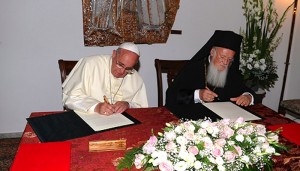 8. From this holy city of Jerusalem, we express our shared profound concern for the situation of Christians in the Middle East and for their right to remain full citizens of their homelands. In trust we turn to the almighty and merciful God in a prayer for peace in the Holy Land and in the Middle East in general. We especially pray for the Churches in Egypt, Syria, and Iraq, which have suffered most grievously due to recent events. We encourage all parties regardless of their religious convictions to continue to work for reconciliation and for the just recognition of peoples’ rights. We are persuaded that it is not arms, but dialogue, pardon and reconciliation that are the only possible means to achieve peace.
8. From this holy city of Jerusalem, we express our shared profound concern for the situation of Christians in the Middle East and for their right to remain full citizens of their homelands. In trust we turn to the almighty and merciful God in a prayer for peace in the Holy Land and in the Middle East in general. We especially pray for the Churches in Egypt, Syria, and Iraq, which have suffered most grievously due to recent events. We encourage all parties regardless of their religious convictions to continue to work for reconciliation and for the just recognition of peoples’ rights. We are persuaded that it is not arms, but dialogue, pardon and reconciliation that are the only possible means to achieve peace.
9. In an historical context marked by violence, indifference and egoism, many men and women today feel that they have lost their bearings. It is precisely through our common witness to the good news of the Gospel that we may be able to help the people of our time to rediscover the way that leads to truth, justice and peace. United in our intentions, and recalling the example, fifty years ago here in Jerusalem, of Pope Paul VI and Patriarch Athenagoras, we call upon all Christians, together with believers of every religious tradition and all people of good will, to recognize the urgency of the hour that compels us to seek the reconciliation and unity of the human family, while fully respecting legitimate differences, for the good of all humanity and of future generations.
10. In undertaking this shared pilgrimage to the site where our one same Lord Jesus Christ was crucified, buried and rose again, we humbly commend to the intercession of the Most Holy and Ever Virgin Mary our future steps on the path towards the fullness of unity, entrusting to God’s infinite love the entire human family.
“May the Lord let his face shine upon you, and be gracious to you! The Lord look upon you kindly and give you peace!” (Num 6:25-26).
Jerusalem, 25 May 2014
Theme for Pope’s visit to Holy Land set as Ut unum sint
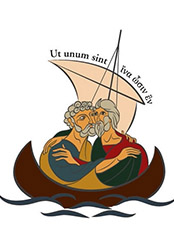 The Holy Father is making a pilgrimage this May 24-26. The Assembly of Catholic Ordinaries of the Holy Land held a planning meeting in Tiberias where they settled on a theme and logo for Francis and the ecumenical as Ut unum sint. The logo (seen here) shows the embrace of Saints and Apostles Peter and Andrew. The two are known as the first-called by Jesus in Galilee, patrons respectively of the Church of Rome and the Church of Constantinople.
The Holy Father is making a pilgrimage this May 24-26. The Assembly of Catholic Ordinaries of the Holy Land held a planning meeting in Tiberias where they settled on a theme and logo for Francis and the ecumenical as Ut unum sint. The logo (seen here) shows the embrace of Saints and Apostles Peter and Andrew. The two are known as the first-called by Jesus in Galilee, patrons respectively of the Church of Rome and the Church of Constantinople.
The news was announced by Terra Sancta.
This is not merely a “trip” but a pilgrimage. The distinction focuses attention to the spiritual and fraternal aspects of being present in a particular place for a particular reason.
Pope Francis and Patriarch Bartholomew will meet in the Basilica of the Holy Sepulchre in order to commemorate and renew the yearning for unity among Christians. The meeting recalls a similar meeting 50 years ago of Pope Paul VI and Patriarch Athenagoras in Jerusalem.
Bartholomew convokes Orthodox Primates
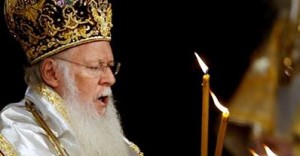 The Ecumenical Patriarch Bartholomew of Constantinople, the point of unity among Eastern Chrsitians, has called the patriarchs and archbishops of the world’s Orthodox Churches to a meeting in Istanbul in March. This meeting is a precursor to a Pan-Orthodox Synod slated for 2015. Orthodox Primates last me in Constantinople in 2008.
The Ecumenical Patriarch Bartholomew of Constantinople, the point of unity among Eastern Chrsitians, has called the patriarchs and archbishops of the world’s Orthodox Churches to a meeting in Istanbul in March. This meeting is a precursor to a Pan-Orthodox Synod slated for 2015. Orthodox Primates last me in Constantinople in 2008.
Asianews.it carries one of the stories. For more on the event and for Metropolitan John Zizioulas of Pergamon’s comments read, “Bartholomew convokes the Primates of the Orthodox Churches.”
The Ecumenical Patriarch is 74 and has served the Church as a priest since 1969 and in this present capacity since 1991. He is the 27oth successor of Saint Andrew the Apostle. His Holiness’ biography is here.
This is terrific news!!!
All the holy Apostles, pray for the Primates!
Pope to Patriarch: pursue fraternal relations
For decades there has been an exchange of greetings between the Pope and the Archbishop of Constantinople. This is what you may say is a traditional expectation between brothers. Rome sends a message through a delegation on the feast of Saint Andrew (today) and the Orthodox do the same on the feast of Saints Peter and Paul (June 29). This year, the feast of Saint Andrew is the first time Pope Francis is able to write to Bartholomew. You’ll note that Pope Francis is keen on working for improved fraternal relations with the Church in Constantinople. Here is a Vatican Radio report.
To His Holiness Bartholomaios I
Archbishop of Constantinople
Ecumenical Patriarch
“Peace be to the brothers, and love with faith,
from God the Father and the Lord Jesus Christ.” (Eph 6:23)
 After welcoming with joy the delegation which Your Holiness sent to Rome for the feast of Saints Peter and Paul, it is with the same joy that I convey, through this message entrusted to Cardinal Kurt Koch, President of the Pontifical Council for Promoting Christian Unity, my spiritual closeness on the feast of Saint Andrew, Peter’s brother and the patron saint of the Ecumenical Patriarchate. With the heartfelt affection reserved for beloved brothers, I offer my prayerful best wishes to Your Holiness, to the members of the Holy Synod, to the clergy, monks and all the faithful, and – together with my Catholic brothers and sisters – join your own prayer on this festive occasion.
After welcoming with joy the delegation which Your Holiness sent to Rome for the feast of Saints Peter and Paul, it is with the same joy that I convey, through this message entrusted to Cardinal Kurt Koch, President of the Pontifical Council for Promoting Christian Unity, my spiritual closeness on the feast of Saint Andrew, Peter’s brother and the patron saint of the Ecumenical Patriarchate. With the heartfelt affection reserved for beloved brothers, I offer my prayerful best wishes to Your Holiness, to the members of the Holy Synod, to the clergy, monks and all the faithful, and – together with my Catholic brothers and sisters – join your own prayer on this festive occasion.
Your Holiness, beloved brother in Christ, this is the first time that I address you on the occasion of the feast of the Apostle Andrew, the first-called. I take this opportunity to assure you of my intention to pursue fraternal relations between the Church of Rome and the Ecumenical Patriarchate. It is for me a source of great reassurance to reflect on the depth and the authenticity of our existing bonds, the fruit of a grace-filled journey along which the Lord has guided our Churches since the historic encounter in Jerusalem between Pope Paul VI and Patriarch Athenagoras, the fiftieth anniversary of which we will celebrate shortly. God, the source of all peace and love, has taught us throughout these years to regard one another as members of the same family. For indeed we have one Lord and one Saviour. We belong to him through the gift of the good news of salvation transmitted by the apostles, through the one baptism in the name of the Holy Trinity, and through the holy ministry. United in Christ, therefore, we already experience the joy of authentic brothers in Christ, while yet fully aware of not having reached the goal of full communion. In anticipation of the day in which we will finally take part together in the Eucharistic feast, Christians are duty-bound to prepare to receive this gift of God through prayer, inner conversion, renewal of life and fraternal dialogue.
Our joy in celebrating the feast of the Apostle Andrew must not make us turn our gaze from the dramatic situation of the many people who are suffering due to violence and war, hunger, poverty and grave natural disasters. I am aware that you are deeply concerned for the situation of Christians in the Middle East and for their right to remain in their homelands. Dialogue, pardon and reconciliation are the only possible means to achieve the resolution of conflict. Let us be unceasing in our prayer to the all-powerful and merciful God for peace in this region, and let us continue to work for reconciliation and the just recognition of peoples’ rights.
Your Holiness, the memory of the martyrdom of the apostle Saint Andrew also makes us think of the many Christians of all the Churches and Ecclesial Communities who in many parts of the world experience discrimination and at times pay with their own blood the price of their profession of faith. We are presently marking the 1700th anniversary of Constantine’s Edict, which put an end to religious persecution in the Roman Empire in both East and West, and opened new channels for the dissemination of the Gospel. Today, as then, Christians of East and West must give common witness so that, strengthened by the Spirit of the risen Christ, they may disseminate the message of salvation to the entire world. There is likewise an urgent need for effective and committed cooperation among Christians in order to safeguard everywhere the right to express publicly one’s faith and to be treated fairly when promoting the contribution which Christianity continues to offer to contemporary society and culture.
It is with sentiments of profound esteem and warm friendship in Christ that I invoke abundant blessings on Your Holiness and on all the faithful of the Ecumenical Patriarchate, asking the intercession of the Virgin Mother of God and of the holy apostles and martyrs Peter and Andrew. With the same sentiments I renew my best wishes and exchange with you a fraternal embrace of peace.
Pope Francis meets with ecumenical partners and representatives of world religions
The Pope met today with Orthodox leaders, Byzantine and Oriental Orthodox, the Anglicans, other ecclesial communities and leaders of various other religions. Of particular interest is the personal meeting of Francis and Bartholomew; the Pope also met with Metropolitan Hilarion of the Russian Orthodox Church.
Rome Reports has a review of this important ecumenical meeting.
First of all, heartfelt thanks for what my Brother Andrew told us. Thank you so much! Thank you so much!
It is a source of particular joy to meet you today, delegates of the Orthodox Churches, the Oriental Orthodox Churches and Ecclesial Communities of the West. Thank you for wanting to take part in the celebration that marked the beginning of my ministry as Bishop of Rome and Successor of Peter.
Yesterday morning, during the Mass, through you , I recognized the communities you represent. In this manifestation of faith, I had the feeling of taking part in an even more urgent fashion the prayer for the unity of all believers in Christ, and together to see somehow prefigured the full realization of full unity which depends on God’s plan and on our own loyal collaboration.
Continue reading Pope Francis meets with ecumenical partners and representatives of world religions
Ecumenical and Interfaith leaders respond to the election of Pope Francis
Surveying what the ecumenical crowd has to say about this papal election is mixed at best. Time will tell about our interfaith friends, namely the Jewish and Muslim communities. It is said that Pope Francis has had very strong friendships with the Jewish community of Argentina.
On Wednesday night when Pope Francis was introduced to the world on the loggia he said, “And now let us begin this journey, the bishop and people, this journey of the Church of Rome which presides in charity over all the churches, a journey of brotherhood in love, of mutual trust. Let us always pray for one another. Let us pray for the whole world that there might be a great sense of brotherhood.”

Pope Francis Portrait Painting (Photo credit: faithmouse)
His All Holiness the Ecumenical Patriarch Bartholomew (of Constantinople) will attend the enthronement of the newly-elected Pope of Rome on March 19. This is the first time since 1054 that Orthodox bishops will be in attendance. Bartholomew will be accompanied by the Metropolitan of Pergamum, John (Zizoulas), the Metropolitan of Buenos Aires, Tarasios (a native of San Antonio, Texas) and the Metropolitan of Italy, Gennadios.
The Russian Orthodox Church’s Department for External Relations, Metropolitan Hilarion of Volokolamsk, spoke on Thursday that he thought a meeting between the Pope Francis and Patriarch Kirill of Moscow was “possible but the place and timing will depend on how quickly we will overcome the consequences of the conflicts from the turn of 1980s and 1990s.” Hilarion notes, “on several occasions, Pope Francis has shown spiritual sympathy towards the Orthodox Church and a desire for closer contacts.” The Orthodox still refuse to accept the fact that some Christians in the Byzantine East want, in their own freedom, be in communion with the bishop of Rome. Tensions run high when it comes to thinking about the Ukrainian Byzantine Church using the title of Patriarch for their head and the existence of Latin Catholic dioceses in Russia.
Continue reading Ecumenical and Interfaith leaders respond to the election of Pope Francis
The Patriarch of Constantinople’s letter to Benedict
The Patriarch of Constantinople, Bartholomew I, wrote a letter on occasion of the abdication of Pope Benedict. It is a warm letter and testimony to his co-worker in the vineyard. In an era of lots of change in the leadership of many changes, it is interesting to what is said,
It is with regret that we have learned of the decision by His Holiness Pope Benedict to retire from his Throne, because with his wisdom and experience he could have provided much more to the Church and the world.
Pope Benedict leaves an indelible mark on the life and history of the Roman Catholic Church, sealed not only by his brief papacy, but also by his broad and longstanding contribution as a theologian and hierarch of his Church, as well as his universally acknowledged prestige.
Continue reading The Patriarch of Constantinople’s letter to Benedict
To the roots of communion
You can count on a delegation from the Ancient See of Constantinople visiting Rome and the Holy Father on the Solemnity of Saints Peter and Paul. Most years a small of group of bishops and archimandrites designated by the Ecumenical Patriarch descend on Rome to pray at the Tombs of Peter and Paul, to attend the Mass with the Pope and those receiving the pallium and to exchange ideas with the Pope. Lunch in the Apostolic Palace is regular. In an editorial by L’Osservatore Romano, Pope Benedict talks more openly about the goal of these ecumenical exchanges. Eucharistic sharing is still impossible, but the hope and identifiable goal is that one day –and one hopes it happens in the next 50 years– that we can be in full visible communion. The editorial is below with my emphasis.
The Second Vatican Council, the 50th anniversary of whose opening is to be celebrated next 11 October, has marked “a new and important phase in relations” between Catholics and Orthodox. In recognizing this the Pope expressed the hope that “progress may also be made in the current phase“, while waiting “to arrive soon at the blessed day when we will be able to share in the Eucharistic banquet“.
The traditional meeting with the Delegation of the Ecumenical Patriarchate of Constantinople, received in audience on Thursday morning, 28 June, on the eve of the Feast of Sts Peter and Paul, was an opportunity for Benedict XVI to recall the importance of the Council in the development of ecumenical dialogue. It was also an opportunity to remember, in particular, the “passion for the unity of the Church” which inspired the Ecumenical Patriarch Athenagoras and the Pontiffs, John XIII and Paul VI, who “made themselves champions of courageous projects that paved the way to renewed relations between the Ecumenical Patriarchate and the Catholic Church”.
